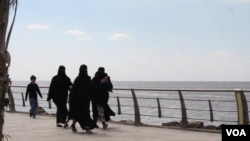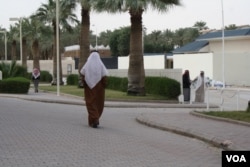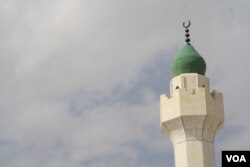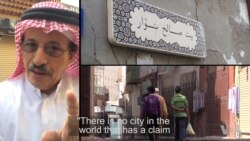On a mild, midwinter evening, religious police circle a trendy Riyadh neighborhood in a car, announcing evening prayers on a loudspeaker.
A row of fashionable cafes on Tahlia Street — separate ones for men and women — all close down at prayer time by law, but some men chatting with us on the street don’t seem to notice. People aren't forced to pray, although Saudi Arabia follows one of the strictest interpretations of Islam, Wahhabism.
In recent years, Wahhabism has been scrutinized as extremists like Islamic State militants claim to follow elements of the faith.
For many Saudis, this school of thought is Islam’s “purest,” preaching peace, tolerance and charity. Others argue that it houses hard-liners who share ideology with extremist groups on issues of women’s rights, blasphemy and retribution for crimes.
In Riyadh and Jeddah, we find the concept of Wahhabism means different things to different people, and very little at all to some. Politicians, students, analysts, activists, academics and local businessmen and women tell us they began hearing themselves described regularly as Wahhabis only about 10 years ago.
Since then, the word "Wahhabi" was used to describe Saudi Arabia so often in the media that Saudis themselves began claiming the term more widely. Back then, as more recently, writers and analysts wondered whether the rise of al-Qaida was related to the growing numbers of fundamentalists in the region.
“I don’t know what is Wahhabi,” Nael Zinada, a Saudi architect and father of four, says outside the cafes. “We feel now that they want to say the Saudi people are all Wahhabi, but I don’t understand exactly. We are Muslims.”
Zinada dismisses the idea that Wahhabism is a sect of Islam, with rituals and rites of its own. There are sects in Saudi Arabia, he says as the religious police continue to announce prayer time in the background. And like the increased visibility of Wahhabism in Saudi Arabia, sectarian tensions are on the rise.
“When I was in college, we barely knew there was something called Shias and Sunnahs,” Zinada says. “Now you feel it.”
Islamic State Wahhabism
On a sunny afternoon on the other side of Riyadh, Naif Abdulaziz, 31, wearing a traditional robe and dark sunglasses, strolls toward a mosque.
The mosque, named for Saudi Prince Talal Ibn Abdulaziz, is among many houses of worship in Saudi Arabia known to me as Wahhabi mosques. Abdulaziz corrects me, saying, "It's a mosque."
When I ask Abdulaziz what is special about Wahhabism, he tells me of 18th-century Sheik Mohamed Bin Abdel Wahhab, who preached a return to the fundamentals of Islam, dismissing “wrong ideas” developed over the centuries. “It’s more of an intellectual school of thought.”
And there are ideological similarities between hard-liners in Saudi Arabia and violent extremists interpreting the same texts, says Khaled Almaeena, a veteran Saudi journalist and former editor in chief of the Saudi Gazette.
“There are interpretations and misinterpretations,” he explains in his seaside office in Jeddah. “There are people who misinterpret. There are hard-liners. Some of the hard-liners who speak are similar to the hard-liners in ISIS [Islamic State], but that is not the government speaking.”
What Saudi rulers and IS do share is a puritanical, often exclusionist view, based on Wahhab's teachings. Wahhab and Saudi leaders were aligned in the region's bloody conquests of the 19th century. The 20th century House of Saud incorporated development and changing social norms with Wahhab's original ideas. Islamic State does not.
In recent years, the Saudi government has implemented more reforms, like giving women the right to vote and hold office. But the hard-liners that journalist Almaeena speaks of are often not too far from official policy.
WATCH: Gateway to Mecca: Historical Old Jeddah
In Saudi Arabia, women need consent from male guardians to make the most basic decisions. Apostasy is punishable by death, and the penalty is usually carried out by public beheadings. Adultery and homosexuality are also considered crimes, punished by flogging and stoning. The hands of thieves are cut off. Saudi Arabia also does not recognize religious freedom, and non-Muslims are not allowed to practice their faith in public.
Islamic State militants do that and more — openly killing Christians, Shia Muslims and anyone else who disagrees with them as a matter of policy.
Unfair comparison?
Outside the mosque in Riyadh, Abdulaziz says it is unfair to compare Saudi practices, carried out by a legitimate state under Islamic law, to extremists who revel in murdering, raping and conducting terrorist attacks, including against Saudi Arabia.
Islam, he says, does not allow violent extremism.
“It is very wrong that people call them the same thing,” Abdulaziz tells me. “Islamic State militants use the name of Islam. It is incorrect because they promote killing. Islam promotes mercy.”
He then excuses himself to wash his hands and feet before the prayer, which, he says, under the Saudi government is a noncompulsory act of devotion. Muslims living under Islamic State militants don't have that choice.









